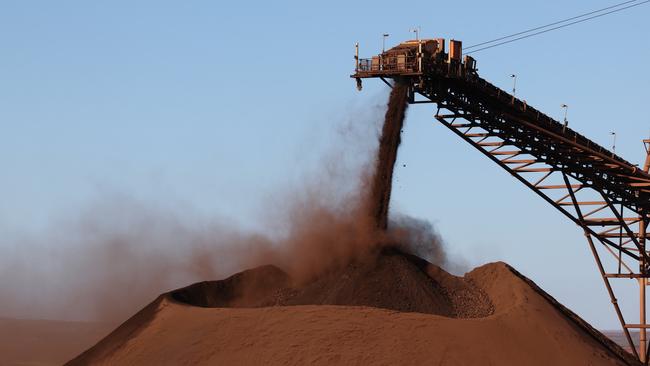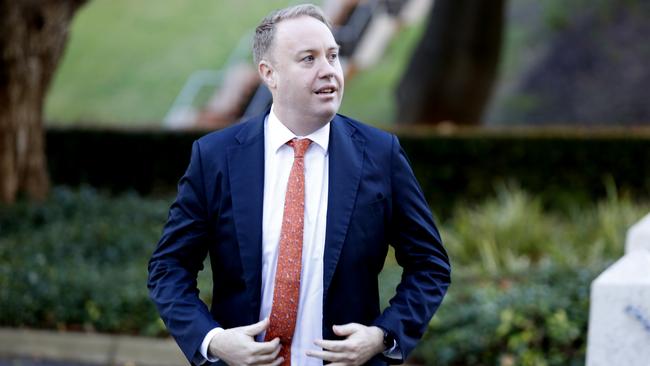WA ruling gives traditional owners significant leverage over the state’s mining industry
Mining companies are alarmed by an expectation they sign expensive new native title agreements with royalty payments to groups asserting traditional ownership over resources-rich WA.

Business
Don't miss out on the headlines from Business. Followed categories will be added to My News.
Mining companies have voiced their alarm at being required to sign new native title agreements which have increasing royalty payments to groups asserting traditional ownership over vast tracts of resources-rich Western Australia.
Their concern is based on a WA government ruling that has set the scene for drawn out and fraught negotiations between traditional owner groups demanding hefty royalties and miners.
More than $1bn in mining royalties is already held in trust by various traditional owner groups registered in WA, and more is set to flow into Indigenous coffers as leases covering some of the state’s oldest mines come up for renewal.
The WA government has told the resources industry that lease renewals will trigger right-to-negotiate provisions under the federal Native Title Act, and that leases in place for more than 40 years won’t be renewed unless companies reach agreement with native title holders or native title claimants.
The WA government advice applies to mines which have operated for decades without native title agreements, and hands significant negotiating power to traditional owner groups. Some of those groups have, in talks with affected mining companies, raised the prospect of backpayment of royalties.
One mining company chief executive, who spoke on the condition of anonymity, said it was like being told to negotiate with a gun pointed at your head.
“We are basically being told that if you don’t have a native total agreement in place, your mining lease won’t be renewed,” he said.
“That’s really difficult for people who have invested a tonne of money over the years, a billion dollars or more in some instances, because they’re now being told that if they want to maintain that investment, they have to negotiate a native title agreement.”
In an anticipation that it could take years to reach agreements with traditional owner groups, the WA government is moving to amend the state’s Mining Act to give companies more time to negotiate deals before their leases expire.

The leases caught up in the WA ruling are those coming up for their second renewal without a native title or Indigenous land use agreement in place. Mining leases are typically issued for 21 years in WA and many pre-date the Native Title Act (1993).
Association of Mining and Exploration Companies chief executive Warren Pearce said the situation created a new layer of costs and uncertainty for companies operating in some of WA’s most mature mining jurisdictions, including the Goldfields where the precious metal was first discovered in 1893.
“It means that there’s going to be a new cost that was unanticipated by companies, and I wouldn’t be surprised if the claims from some of those (traditional owner) groups are quite expansive,” he said.
“If you are in this situation, before you get your lease renewal you’re going to have to go through this process and that creates a pretty obvious leveraging point for native title bodies.”
AMEC considered a fundraising campaign to pay for a legal challenge before opting to not proceed.
“We went and got legal advice from a KC (King’s Counsel) and what came back was there’d be an arguable case that you could test in a court to try and go against that WA government advice, but it is probably not a strong one,” Mr Pearce said.
WA Mines and Petroleum Minister David Michael referred a series of questions on the issue to his department for a response.
The WA Department of Energy, Mines, Industry Regulation and Safety (DEMIRS) confirmed the WA government’s view that the second renewal of mining leases triggered right-to-negotiate provisions under the Native Title Act.
“Mining leaseholders will be required to negotiate with affected native title holders and claimants,” the department said.
It is understood the ruling is based on legal advice from the State Solicitor’s Office around future act provisions in the Native Title Act, but DEMIRS declined to reveal the source. A future act is defined as any proposal to deal with land in a way that affects native title rights and interests.
In a note to mining companies issued this month, DEMIRS said: “The Native Title Act requires the future act process to be followed wherever native title exists, is claimed to exist, or may exist, to ensure the validity of the proposed action.
“A mining lease cannot be renewed under s78(2) of the Mining Act until all future act requirements are met. Mining lease holders are encouraged to proactively engage with native title parties to secure the necessary consent well ahead of the renewal deadlines.
“Evidence demonstrating the future act requirements of the Native Title Act have been met is required before a second renewal can be determined. If consent has been sought but not yet granted, your supporting information should include details such as the required consent authority and any evidence of ongoing discussions.”
WA’s big iron ore miners have their operations covered by state agreements and native title agreements. Many other miners have negotiated native title agreements, but a significant portion of mining leases and operations have never been covered.
The WA government said it was unable to provide an estimate of how many leases would be caught up in its ruling.
It has written to companies with leases due to expire in 2024-25 about the native title requirements.
Mr Pearce said WA’s longest-standing mining leases had only recently come up for second renewal.
“The numbers through the first year are low, but it’ll grow over time as more companies get pulled into the into the picture,” he said.
Originally published as WA ruling gives traditional owners significant leverage over the state’s mining industry



